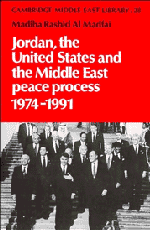Book contents
- Frontmatter
- Contents
- Foreword by William B. Quandt
- Acknowledgements
- Prologue
- 1 Introduction
- 2 Kissinger's legacy and imprint on the Middle East
- Part I Jordan in the Carter Middle East policy
- Part II Jordan in the Reagan Middle East policy
- Part III US, Jordan and Arab approaches to peace
- Appendices
- A Comparison of Middle East peace proposals
- B Jordan–US exchange of questions and answers on the Camp David Accords, September 1978
- C US assistance to Jordan 1975–1989
- D Arab assistance to Jordan paid in accordance with the 1978 Baghdad Summit Conference and 1980 Amman Arab Summit
- E Peres–Hussain Agreement (The London Document), 11 April 1987
- F Shamir's Four-point plan, April 1989
- G Baker's Five-point plan, December 1989
- H Invitation to Madrid Peace Conference, 18 October 1991
- I Letter of Assurances to the Palestinians, 18 October 1991
- Notes
- Select bibliography
- Index
- Cambridge Middle East Library
H - Invitation to Madrid Peace Conference, 18 October 1991
Published online by Cambridge University Press: 25 February 2010
- Frontmatter
- Contents
- Foreword by William B. Quandt
- Acknowledgements
- Prologue
- 1 Introduction
- 2 Kissinger's legacy and imprint on the Middle East
- Part I Jordan in the Carter Middle East policy
- Part II Jordan in the Reagan Middle East policy
- Part III US, Jordan and Arab approaches to peace
- Appendices
- A Comparison of Middle East peace proposals
- B Jordan–US exchange of questions and answers on the Camp David Accords, September 1978
- C US assistance to Jordan 1975–1989
- D Arab assistance to Jordan paid in accordance with the 1978 Baghdad Summit Conference and 1980 Amman Arab Summit
- E Peres–Hussain Agreement (The London Document), 11 April 1987
- F Shamir's Four-point plan, April 1989
- G Baker's Five-point plan, December 1989
- H Invitation to Madrid Peace Conference, 18 October 1991
- I Letter of Assurances to the Palestinians, 18 October 1991
- Notes
- Select bibliography
- Index
- Cambridge Middle East Library
Summary
After extensive consultations with Palestinians, Arab states and Israel, the United States and the Soviet Union believe that an historic opportunity exists to advance the prospects for genuine peace throughout the region. The United States and the Soviet Union are prepared to assist the parties to achieve a just, lasting and comprehensive peace settlement, through direct negotiations along two tracks, between Israel and the Arab states, and between Israel and the Palestinians, based on United Nations Security Council Resolutions 242 and 338. The objective of this process is real peace.
Toward that end, the President of the United States and the President of the USSR invite you to a peace conference, which their countries will co-sponsor, followed immediately by direct negotiations. The conference will be convened in Madrid on October 30, 1991. President Bush and President Gorbachev request your acceptance of this invitation no later than 6:00 p.m. Washington time, October 23, 1991, in order to ensure proper organization and preparation of the conference.
Direct bilateral negotiations will begin four days after the opening of the conference. Those parties who wish to attend multilateral negotiations will convene two weeks after the opening of the conference to organize those negotiations. The co-sponsors believe that those negotiations should focus on region-wide issues such as arms control and regional security, water, refugee issues, environment, economic development, and other subjects of mutual interest.
- Type
- Chapter
- Information
- Publisher: Cambridge University PressPrint publication year: 1993



